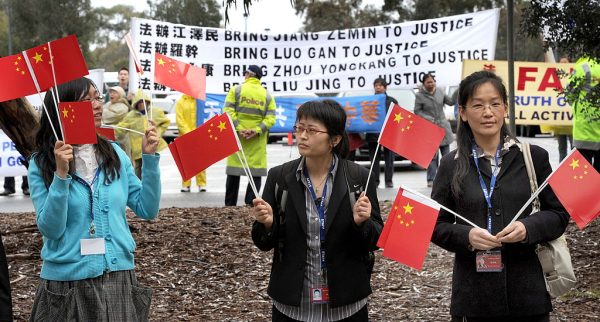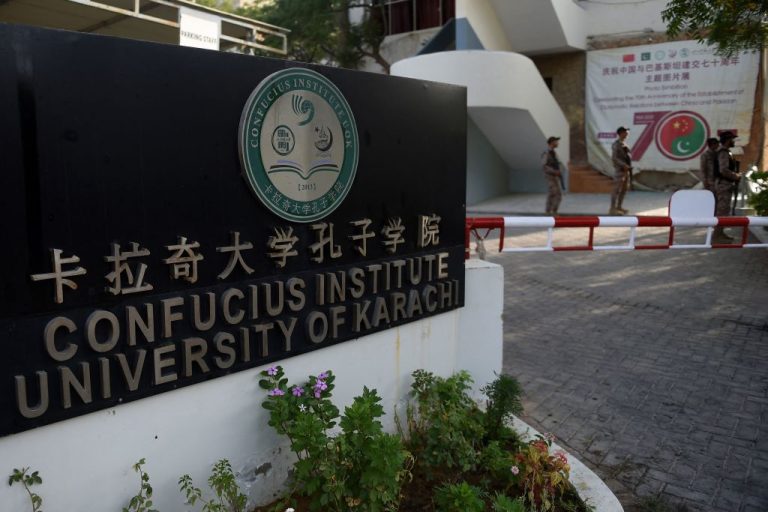As a new academic year kicks off, the specter of the Chinese Communist Party’s (CCP) indoctrination and espionage activities looms large on American campuses.
Even as more universities and colleges sever ties with Beijing-funded cultural centers, a noticeable pivot by China toward bilateral agreements — particularly with institutions that draw defense and security funding — have surfaced, according to think tank Hudson Institute.
‘Cognitive warfare’
An online seminar by the institute highlighted concerns about China’s covert operations. “The Chinese Communist Party will again be indoctrinating and spying on students on American college campuses this academic year in an organized effort known as ‘cognitive warfare.’” Their objective? “To suppress criticism of Chinese President Xi Jinping and his policies, promote Chinese Communist Party propaganda, and steal pivotal research,” it said.
Established in 1961 by strategist Herman Kahn, the Hudson Institute is a research organization that aims to “promote American leadership” in the fields of defense, international relations, economics, energy, technology, culture, and law to promote a more “secure, free, and prosperous future.”

Recent revelations about Beijing-backed Confucius Institutes — branded as cultural and linguistic centers within American universities — have led many institutions to revoke their agreements with these entities, a report by Radio Free Asia (RFA) unveiled.
Success
You are now signed up for our newsletter
Success
Check your email to complete sign up
Though the number of Confucius Institutes once exceeded 100 across the U.S., they have now dwindled to around a dozen, the U.S.-based outlet noted. However, this reduction does not imply the cessation of Beijing’s influence. Experts emphasize that China has merely adapted its approach by leveraging entities like the government-supported Chinese Students and Scholars’ Associations, which have come under scrutiny for “monitoring and political maneuvering.”
“Not all college administrators act to stop Chinese Communist Party interference on their campuses,” the Hudson Institute said in the seminar.
Ulterior motives
Ian Oxnevad, a senior fellow at the National Association of Scholars, shed light on the varied motivations behind Beijing’s maneuvers. From portraying a favorable image of China and its regime to accessing critical technologies with both commercial and military applications, the intent is multifaceted, he said during the seminar.
RELATED: UK Drafting Ban on Confucius Institutes Following Sunak’s Appointment as PM
Oxnevad also spotlighted how the CCP has a long-term strategy at play when it comes to its stealth infiltration of U.S. and other international sources of academia.
“You also have an elite capture issue, … looking at shaping the views of future policy-makers by molding student perspectives today,” he noted, adding that while Confucius Institutes have faced “significant pushback,” China’s influence operation remains agile, perpetuating concerns of eroding intellectual freedom.
Military and academic ties
One evolving trend is China’s shift toward bilateral agreements with universities, particularly those attracting defense or security funding, Oxnevad noted. He also raised the alarm regarding American universities inadvertently collaborating with Chinese institutions linked to the People’s Liberation Army (PLA).
MORE ON THIS: Confucius Institutes Rebrand on Canadian Soil Under New Name
Highlighting a specific case, Oxnevad recounted a situation at Alfred University in New York where CCP agents had alleged ties to the school’s engineering department. “It had received a multimillion dollar contract from the U.S. government for hypersonic missile technology. Surprisingly, certain individuals from the university’s engineering program had connections to the now-defunct Confucius Institute.”
Furthermore, he added that U.S. institutions funded by the Department of Defense or the National Security Agency are seemingly more attractive to Beijing-run affiliations.
Falun Gong: A beacon of resistance
Cynthia Sun, a representative with the Falun Dafa Information Center, highlighted the intense scrutiny faced by Falun Gong practitioners in U.S. campuses with ties to the CCP.

“We saw a lot of physical and digital surveillance by Chinese proxies,” Sun told RFA in regards to a recent survey pointing out “transnational repression” patterns targeting Falun Gong adherents across American schools. “Nationwide, there are at least 45 universities and colleges with students or faculty who practice Falun Gong on campus,” she added.
Falun Gong, also known as Falun Dafa, is an ancient Chinese spiritual discipline that combines meditation with teachings rooted in truthfulness, compassion, and tolerance.
Flourishing in China during the early 1990s — with nearly one in every thirteen Chinese citizens adopting it — the practice soon drew the CCP’s ire as it viewed the widely popular practice as a challenge and threat to its authoritarian control. Beginning July 20, 1999, the CCP initiated a widespread campaign to suppress the practice. To this day, the persecution continues unabated, and has resulted in the deaths of thousands of Falun Gong practitioners under Chinese police custody.
RELATED: Orange County, NY Rally Shines Spotlight on Persecution of Falun Gong in China
As a result of this harassment by the CCP’s proxies, Sun said “up to 20 percent [of adherents enrolled in U.S. campuses] felt uneasy identifying as a Falun Gong practitioner due to potential repercussions.”
While relaying the account of a Falun Gong practitioner studying in California, she shared how the student’s “family members in China were contacted regarding [their] whereabouts.” This surveillance extends to Hong Kong activists and ethnic minorities as well, Sun said — reflecting Beijing’s overarching strategy to control narratives and perspectives outside of China.
In her insights, Sun also drew attention to the Chinese Students and Scholars Associations, an organization that is funded and directed by the Chinese consulate. “They carry forward this message of continued self-censorship, of continued surveillance,” she cautioned.
“It’s hard to fathom this occurring in American universities. Yet, through entities like the CSSAs and remnants of Confucius Institutes, the influence of party thought persists.”














